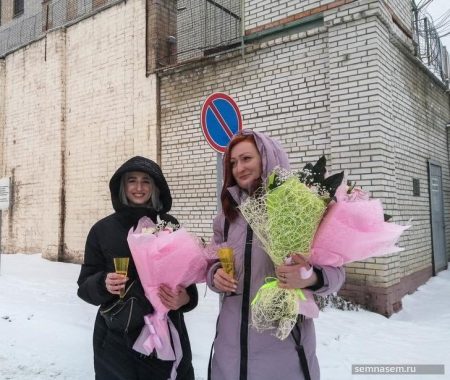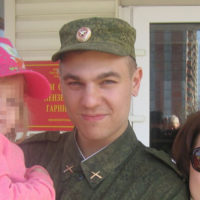If you have found a spelling error, please, notify us by selecting that text and pressing Ctrl+Enter.
Defendants in Network Case Receive Up to 18 Years in Prison
The Volga District Military Court, [sitting in Penza], has [convicted and] sentenced seven defendants in the Network Case.
Dmitry Pchelintsev was sentenced to 18 years in a maximum-security penal colony. Ilya Shakursky was sentenced to 16 years in a penal colony and fined 50,000 rubles. Investigators claimed they were organizers of a “terrorist community.” Both men alleged that FSB officers had electrocuted them in order to obtain confessions.
Maxim Ivankin was given 13 years in a maximum-security penal colony, while Andrei Chernov was sentenced to 14 years, and Mikhail Kulkov, to 10 years. They were found guilty of involvement in a “terrorist community” and attempting to sell drugs.
Vasily Kuksov was sentenced to 9 years in a penal colony. He was accused of involvement in a “terrorist community” and illegal possession of a weapon.
Another defendant, Arman Sagynbayev, received 6 years in prison.
The verdict handed down by the court in Penza suggests that the acquittal of the Petersburg defendants in the case is less likely, Viktor Cherkasov, the lawyer for Viktor Filinkov, a defendant in the Network Case, told Bumaga.
“It sends a message,” said Cherkasov. “It is difficult to hope [for a positive outcome], but we are still determined to protect Filinkov’s interests.”
Cherkasov said that he planned in court to point to the faked evidence in the case. He also that he would take the case to the European Court of Human Rights if Filinkov were found guilty. The next hearing in the Network Case in Petersburg should take place between February 25 and February 28.
[In October 2017 and January 2018], antifascists and anarchists were detained in Penza and Petersburg. They were accused of organizing a “terrorist community,” allegedly called “the Network.” Its alleged purpose was to “sway the popular masses for further destabilization of the political situation” in Russia.The defendants in the case said investigators had tortured them as a way of forcing them to confess and weapons had been planted on their persons and property to further implicate them. [Some of] the arrested men had played airsoft together: this, investigators, said was proof they were planning terrorist attacks.
Investigators claim that the Petersburg defendants in the case, Filinkov and Yuli Boyarshinkov, acted as the group’s sapper and signalman, respectively. Their trial is scheduled to resume in late February.
At the end of the court hearing, Mediazona, the human rights defenders’ web site, reported:
The session is over. The sentence was read out in complete silence. Now, behind the court’s closed doors it is very noisy. Those who came to support the defendants are shouting: “Free political prisoners!”
“Stay strong, we are with you”, one of the support group shouted out.
“No, it’s we who are with you!” answered Dmitry Pchelintsev, one of the defendants. […]
People shouted “shame!” and “freedom!” […]
Outside court, a crowd gathered. Some people played drums, others sang, waiting for those convicted to be taken away in prison vans. Alongside stood security services officers in masks.
Vehicles left [the court] in a convoy. According to Mediazona’s correspondent, OMON [riot police] officers threw their coats over the convicts, so as to pass the crowds unseen. The supporters then began to go their separate ways.
At the end of last month, as the sentencing drew near, two of the “network” case defendants, Dmitry Pchelintsev and Maxim Ivankin, were married to their partners in remand prison. This report by 7×7 was translated by the Russian Reader:
Registry Office workers registered Dmitry Pchelintsev’s marriage to his girlfriend, Anastasia Tymchuk, in the room on the premises of Penza Correctional Facility No. 4 where the defendants are currently held. Journalists, relatives, and friends of the couple were not allowed to attend the ceremony. Tymchuk reported that the groom made her a windcatcher as a wedding gift.
“It makes no difference what our life will be like from here on out: whatever the verdict and sentence are, we are still going to be together. We are still going to see this through

Anastasia Pchelintseva (left) and Anna Shalunkina after their weddings with Dmitry Pchelintsev and Maxim Ivankin
to the end. We are going to seek the truth and do everything to secure [Dmitry’s] release,” Pchelintsev’s bride told journalists.
Another defendant in the case, Maxim Ivankin, registered his marriage to Anna Shalunkina at Penza Remand Prison No. 1. Ivankin had proposed to his girlfriend right in the courtroom after one of the hearings in the trial, presided over by judges from the Volga Military District Court.
“The whole procedure took two minutes,” Shalunkina said after the ceremony. “We only managed to ask each other how the other was doing. Whereas [Pchelintsev and Tymchuk] were allowed to sit next to each other and chat, here [in remand prison] there were two stools, a table, and a cage. I stood next to the table, and [Ivankin] stood in the cage. We were permitted to kiss each other only through the bars.”
Shalunkina explained that she had decided to marry Ivankin now because if he is found guilty, it is unclear where he will be taken to serve his sentence.
In August of last year, Yuli Boyarshinov, a defendant in the Petersburg portion of the Network Case, was married in remand prison. His bride wore a paper veil, and their wedding rings were fashioned from barbed wire.
■ You can support the “network” case defendants by sending them solidarity messages, donating to the support campaign, and spreading the word about the case. See the Rupression site for details
■ More on the case on People & Nature here, here and here
Translated by the Russian Reader
The New York Times: Russia Sentences Anti-Fascists on Bogus Terror Charges, Critics Say
The Guardian: Russian antifascist group given ‘monstrous’ jail terms
This verdict doesn’t leave me at a loss for words. I’m just convinced there is no point in using them when everyone who could listen has made a point of tuning out people like me. If someone invited me to appear on their aptly named alternative radio program or their globe-spanning Qatar-based international TV network (as nearly happened in the past), I could talk for hours about the Network Case. But that’s not going to happen. Although if I were a betting man, I would wager that our tiresome planet’s obnoxious pillars of liberal truth—the New York Times, the Guardian, the Washington Post, and Al Jazeera, among others—will suddenly weigh in on the case after blithely ignoring it for two years, as will many if not all of the crypto-Putinist “Russia watchers” in our midst, eerily silent until now. Barring a sudden revolution, don’t imagine this is the last such case in Russia, a country that has worried so many people around the world for the last several years that they’re determined not to know anything particular about it except “Putin” and “troll factories.” And don’t imagine that a show trial just as juicy and unjust won’t be coming to a theater near you. Please don’t reprint, repost or otherwise reference this article without prefacing it with my remarks. I’d like to preempt “spontaneous” shows of “solidarity” by people who couldn’t be bothered to do anything when it would have made a difference. Despite the well-known saying, it IS a popularity contest, and seven innocent young men in Penza have lost it. [TRR]






